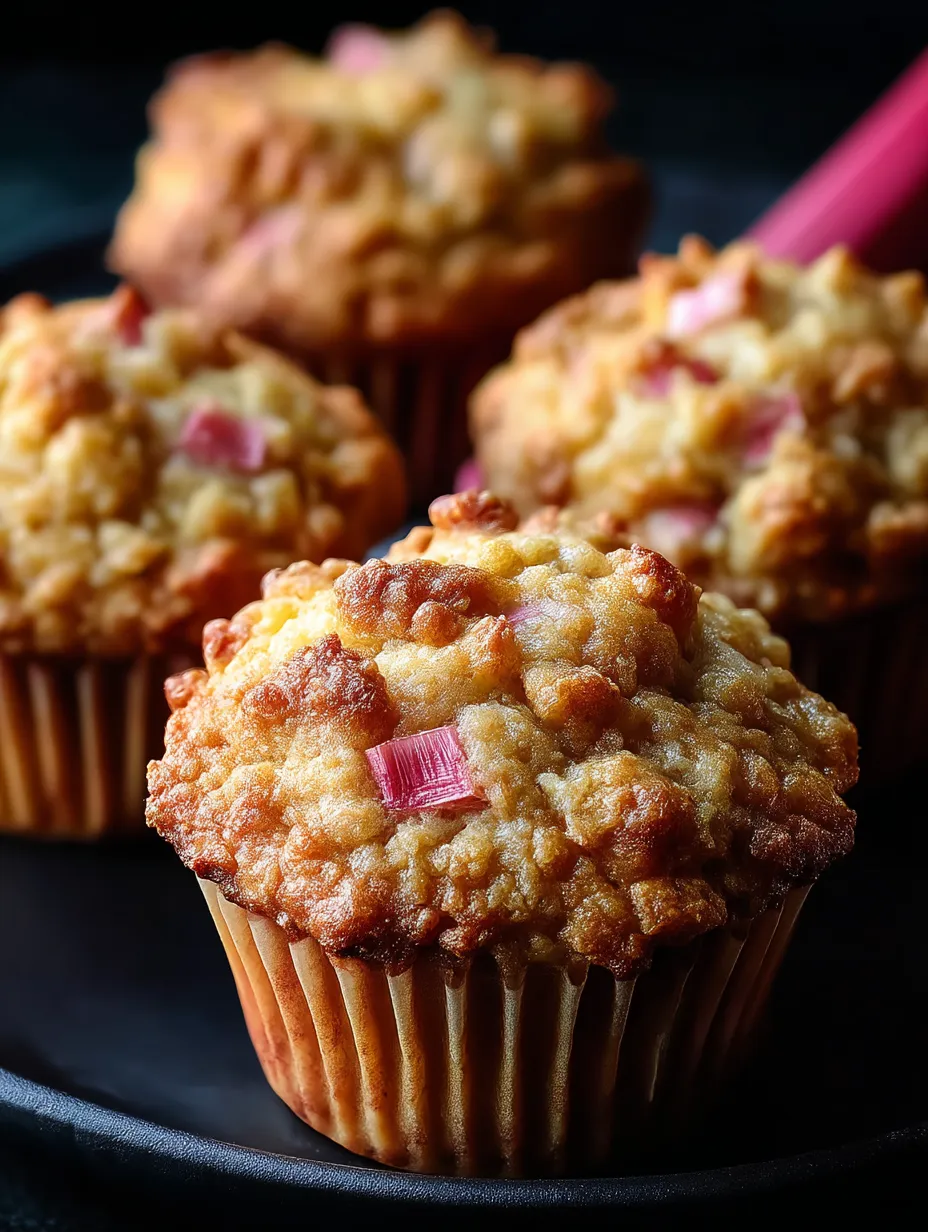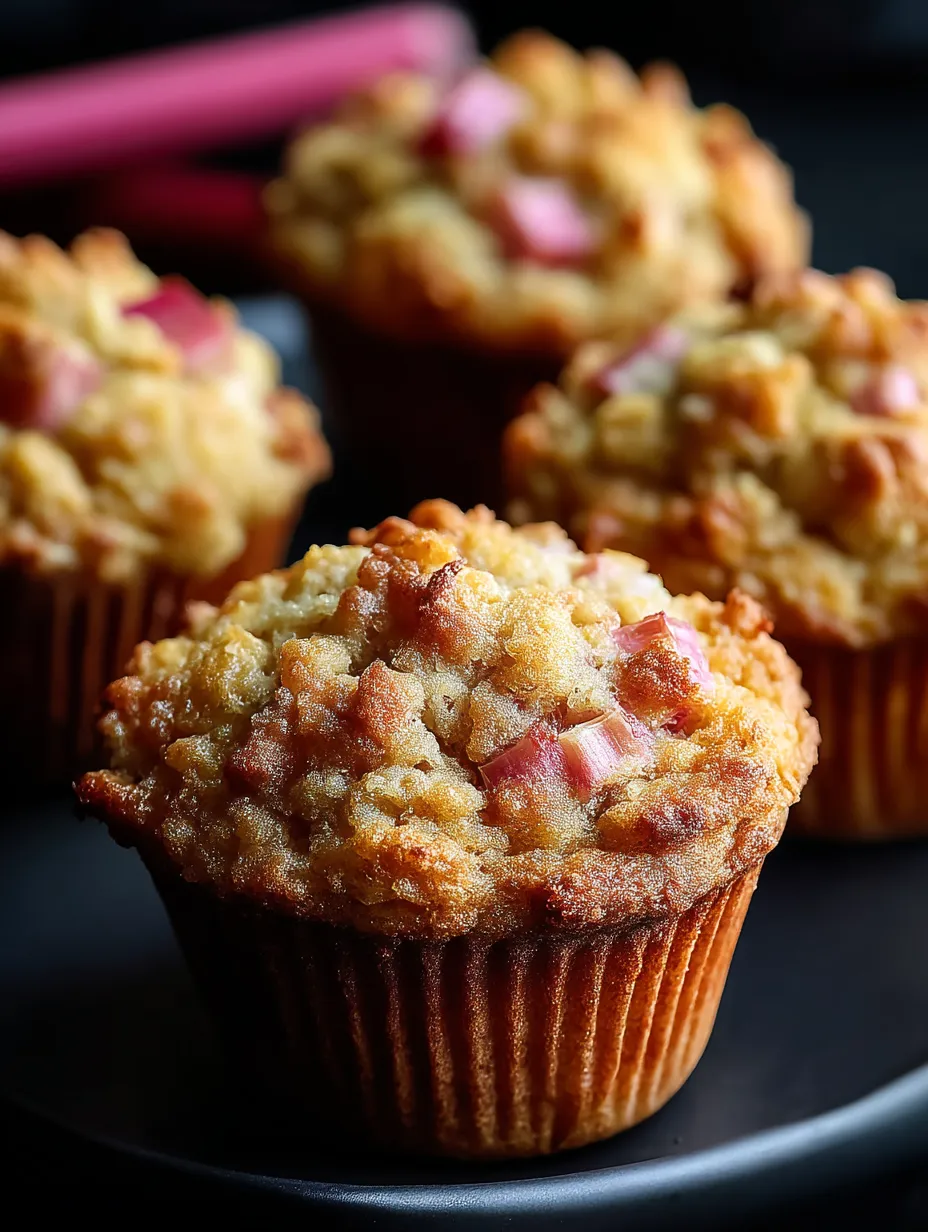 Save
Save
This springtime rhubarb muffin recipe transforms the tart stalks of garden-fresh rhubarb into delicately sweet breakfast treats perfect for your Easter celebration. The bright tang of rhubarb balances beautifully with brown sugar and lemon zest, creating muffins that taste like the first warm days of spring in every bite.
I discovered this recipe when my neighbor brought over armfuls of garden rhubarb one spring afternoon. After experimenting with several batches, these muffins became our Easter morning tradition, with my children eagerly checking the garden each spring for the first rhubarb stalks.
Ingredients
- 2 cups rhubarb diced small: the star ingredient that provides a delightful tanginess and beautiful pink hue throughout the muffins
- 1/2 cup granulated sugar: tames the tartness of rhubarb by drawing out moisture and sweetening the fruit
- 1/4 cup brown sugar: adds depth and moisture with its molasses notes
- 2 cups all-purpose flour: provides structure; use unbleached for best flavor
- 1/2 cup unsalted butter melted: creates richness and tender crumb
- 1/2 cup milk: adds moisture; whole milk creates the richest texture
- 2 eggs: bind ingredients and provide structure; room temperature works best
- 1 tsp vanilla extract: enhances sweetness; use pure, not imitation
- 1 tsp baking powder: provides lift for fluffy muffins
- 1/2 tsp baking soda: reacts with the acidity in rhubarb for extra rise
- 1/2 tsp salt: balances sweetness and enhances flavors
- Zest of 1 lemon: brightens the flavor profile with citrus notes
Step-by-Step Instructions
- Prepare the Rhubarb:
- Toss your diced rhubarb with granulated sugar in a bowl and let it sit while you prepare the remaining ingredients. This process, called macerating, draws moisture from the rhubarb and begins to soften it while balancing its natural tartness. Look for the rhubarb to become slightly glossy and release some liquid.
- Mix the Wet Ingredients:
- In a large bowl, whisk together the brown sugar and melted butter until combined. The mixture should look like wet sand. Add milk, eggs, and vanilla extract, whisking until smooth and fully incorporated. The mixture will be quite liquid at this stage.
- Combine the Dry Ingredients:
- In a separate bowl, whisk together flour, baking powder, baking soda, salt, and lemon zest. Make sure to distribute the leavening agents evenly throughout the flour to ensure even rising. The lemon zest should be fragrant and visible throughout the dry mixture.
- Create the Batter:
- Add the dry ingredients to the wet mixture, stirring gently with a spatula. Mix just until no dry streaks remain, being careful not to overmix, which would develop too much gluten and result in tough muffins. The batter will be thick and slightly lumpy, which is exactly what you want.
- Fold in Rhubarb:
- Gently fold the sugared rhubarb along with any juices into the batter until just distributed. You should see beautiful ribbons of pink throughout the batter. Some chunks should remain visible for texture contrast in the finished muffins.
- Fill Muffin Cups:
- Divide the batter evenly among twelve lined muffin cups, filling each about three-quarters full. Use an ice cream scoop for even portions. The tops should be slightly rounded but not overflowing.
- Bake to Perfection:
- Bake in your preheated oven for 20 to 25 minutes. Look for golden brown tops and a toothpick inserted in the center that comes out clean or with a few moist crumbs. The tops should spring back when lightly touched.
- Cool and Enjoy:
- Allow the muffins to rest in the tin for 5 minutes before transferring to a wire rack. This brief resting period helps the muffins set up properly. Cool completely before storing, or serve slightly warm for the best flavor experience.

Rhubarb holds a special place in my heart as one of spring's first garden harvests. My grandmother always said rhubarb was nature’s way of telling us to wake up our taste buds after winter. The first time I served these muffins at Easter brunch, my uncle, who claimed to hate rhubarb, ate three without realizing what was in them.
Seasonal Rhubarb Selection
Spring rhubarb from April through June tends to be more tender and less stringy than later-season harvests. Look for stalks that are firm and crisp, with bright color ranging from pale pink to deep red. While color doesn’t affect flavor, the redder varieties create more beautiful pink flecks throughout your muffins. Avoid stalks with brown spots or that feel soft or rubbery. Remember that rhubarb leaves are toxic and should always be removed before cooking.
Make Ahead and Storage
These muffins actually improve with a day of rest as the flavors meld together. Store at room temperature in an airtight container with a paper towel on the bottom to absorb any moisture for up to 3 days. For longer storage, freeze completely cooled muffins in a single layer on a baking sheet, then transfer to a freezer bag once solid. Thaw at room temperature or reheat frozen muffins in a 300°F oven for about 10 minutes until warmed through.

Easter Brunch Pairings
Transform these muffins into a complete Easter brunch by serving alongside a savory egg casserole and fresh fruit salad. For an extra special touch, create a simple lemon glaze by whisking together 1 cup powdered sugar with 2 tablespoons lemon juice and drizzle over slightly cooled muffins. You can also serve with whipped honey butter lightly sweetened with maple syrup for an indulgent spread that complements the tartness of the rhubarb beautifully.
Rhubarb Variations
While this classic recipe showcases pure rhubarb flavor, you can introduce complementary ingredients for different flavor profiles. Add 1 cup of strawberries alongside the rhubarb for a classic pairing, or include 1/2 cup of chopped crystallized ginger for warming spice notes. For texture contrast, sprinkle the tops with a streusel mixture of 2 tablespoons each brown sugar, flour, and cold butter cut together until crumbly before baking.
Frequently Asked Questions
- → Can I use frozen rhubarb instead of fresh?
Yes, frozen rhubarb works well in these muffins. Thaw it completely first and drain excess liquid to prevent the batter from becoming too wet. You may need to add an extra tablespoon of flour to compensate for the additional moisture.
- → How can I tell when the muffins are perfectly baked?
The muffins are done when the tops spring back lightly when touched and a toothpick inserted into the center comes out clean or with a few moist crumbs. They should be golden brown around the edges. Avoid overbaking as this can dry them out.
- → What can I substitute for rhubarb if it's not in season?
Strawberries make an excellent substitute that maintains the spring theme. Tart apples or cranberries can also work well to replicate the tangy-sweet balance. For each cup of rhubarb, use an equal amount of your chosen substitute.
- → Can I make these muffins gluten-free?
Yes, these muffins can be adapted to be gluten-free by substituting the all-purpose flour with a 1:1 gluten-free baking flour blend. Make sure your baking powder and baking soda are also certified gluten-free.
- → What toppings would complement these muffins?
A simple streusel topping made with butter, flour, and sugar adds wonderful texture. Alternatively, a light glaze made with powdered sugar and lemon juice enhances the spring flavor profile. For serving, a dollop of honey butter or cream cheese spread pairs beautifully.
- → How do I store these muffins to keep them fresh longer?
For optimal freshness, cool the muffins completely then store in an airtight container with a paper towel on the bottom and another on top to absorb moisture. They'll keep at room temperature for 3 days. For longer storage, wrap individually in plastic wrap and freeze for up to 3 months.
